Innocence and Vulnerability, Resistance (Part II)
INTRODUCTION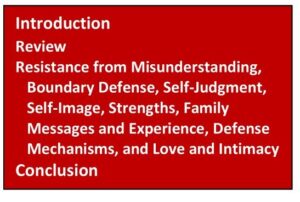
In this Letter we continue our discussion of some of the resistances to innocence and vulnerability.
These resistances stop us from being innocent and vulnerable and are inevitable because we are only beginning to learn how to use these aspects of our self. Also, if we want to increase our experience of innocence and vulnerability we will encounter the natural resistance that accompanies the process of change. Even though it is the change of self-improvement we will face the resistance that says, “No stay the same this change is too dangerous.” In this Letter we will also explore ways to overcome resistance.
REVIEW FROM THE MARCH LETTER
Resistance is a natural and useful phenomenon that is a part of life. Resistance is what slows and stops things that are moving or keeps things from moving when they are still. Before considering resistance in the psychological realm, let’s look at physical resistance to help us get a feel for this phenomenon. Consider resistance in the form of friction for example. As we walk our shoes experience friction with the sidewalk. The friction makes it possible for us to walk, to move forward. Without this resistance we could not walk. Resistance in the physical realm is essential. However, in the psychological realm resistance can keep us stuck when we want to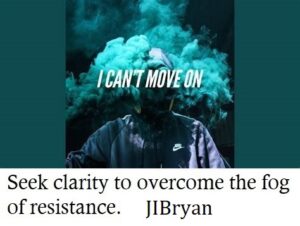 move forward.
move forward.
In the psychological realm resistance is the factor that keeps us the same, which is of value since we need some degree of stability and consistency. However resistance is also “the reason why I can’t” and can keep us frozen in place. Resistance can result in pulling away from the thing that we are resistant to.
RESISTANCE AND RESOLVING RESISTANCE TO INNOCENCE AND VULNERABILITY
Let’s explore various resistances and ways to resolve them.
There is resistance of misunderstanding is triggered by seeing innocence and vulnerability through the usual definitions. Innocence is defined as naive, guileless, simple, blind, or foolish. In our discussion of innocence we have discovered that none of this is true, that innocence is a strength that takes strength to use. We described all the wonderful places innocence takes us. Vulnerability is defined as being unprotected and susceptible to harm. The openness of vulnerability does require self-protection to prevent possible harm. But we can protect ourselves from emotional injury and harm by learning to use our powers of sensing, observing, feeling, thinking, analyzing, and acting. Consult earlier Letters to understand our definitions of innocence and vulnerability, learn about the positive benefits of innocence and vulnerability, and learn how to use them wisely.
As we are innocent, seeing a situation as new and as we are vulnerable, exposing our inner self, we will experience situations that need the self-protection of setting a boundary by expressing “no” in some form. “No, I won’t allow you to treat me this way.” “No I will not spend time with you if you take advantage of me,” are two examples. If you have difficulty saying no and therefore difficulty setting the boundary of self-protection, you will fear innocence and vulnerability. And, as we have been saying, we avoid what we fear. Develop the ability to say no to set boundaries to protect yourself. Having the ability to say no, to assert yourself, is important in many areas of our life.
Point of Empowerment: We can observe, sense, feel, think, and analyze to identify situations that are harmful to us. We can act to say “no, I won’t allow this treatment” to protect ourselves.
Self judgement is a pain we inflict on ourself. It is generated by a harsh, demanding, judgmental, and perfectionistic conscience. We can be brutally self-critical if we see our faults. We then avoid vulnerability because we don’t want to see our faults. Develop a supportive, even loving conscience. Recognize judgmental and overly critical self-talk, the statements you make toward yourself. Reprogram your conscience with affirmations that create self-acceptance, affirmations like: “I now love and accept myself exactly as I am.” Recognize expectations that come from the perfectionist demands of a harsh conscience, expectations like, “I expect you to be perfect otherwise you are nothing.” State affirmations like, “I am now gentle with myself feeling that I am good enough exactly the way I am.” Modify your conscience to open yourself to vulnerability.
Vulnerability and innocence open us to aspects of ourself that may contradict the image we hold of ourself. Our self-image governs how we think, feel, and behave in different situations. We have many self-images, one for being in a romantic relationship or one for being at work, for example. Holding a belief that vulnerability means being weak and dependent will contradict a self-image that says, “I am strong and independent.” A belief that innocence is naïve and simple will contradict a self-image of being sophisticated. These contradictions result in resistance. We then conclude that innocence and vulnerability are not for us. Recognize and understand these contradictions. Resolve the contradiction by changing your self-image or belief to allow both to be compatible with innocence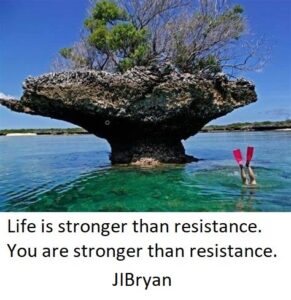 and vulnerability. For example, change the belief that vulnerability is weakness to a belief that to be vulnerable takes a strong person which will be consistent with the self-image that you are a strong person. Or change the belief that innocence is unsophisticated to the belief that innocence allows you to see the complications of life and is therefore a sophistication. Change the self-image to, “My sophistication includes seeing the complexity of life that innocence helps me see.”
and vulnerability. For example, change the belief that vulnerability is weakness to a belief that to be vulnerable takes a strong person which will be consistent with the self-image that you are a strong person. Or change the belief that innocence is unsophisticated to the belief that innocence allows you to see the complications of life and is therefore a sophistication. Change the self-image to, “My sophistication includes seeing the complexity of life that innocence helps me see.”
Point of Empowerment: We can change beliefs and self-images using affirmations and visualizations. Using the above example, state the affirmation, “I am a strong person who understands that it takes strength to be vulnerable.” Visualize yourself in a situation where you are both strong and vulnerable. Feel good about yourself.
We resist the vulnerability of seeing our strengths, good qualities, and abilities because we are afraid that others will be jealous and envious and try to “take us down.” Learn to tolerate and respond to another person’s jealousy and envy if it comes your way. Understand that no one can “take you down” without your cooperation in this. Recognize the value of your strengths, good qualities, and abilities. This recognition empowers you to protect yourself and to dismiss the impact of the negative actions of others toward you.
Point of Empowerment: Recognize the value of your strengths, good qualities, and abilities. This recognition creates the self-esteem that gives you the strength and determination to be who you want to be. With self-esteem you become independent of and untouched by the opinions of others.
We also resist the vulnerability with ourselves that shows us our strengths, good qualities, and abilities because we may fear that we can’t live up to expectations that our strengths, good qualities, and abilities seem to imply. We may belief that, “Because I am strong I always have to be strong. But since I can’t and don’t want to always be strong, I avoid being vulnerable with my strength. I don’t want to see my strength.” Or “Because I care I have to always be caring. But since I can’t and don’t want to always be caring I avoid being vulnerable with my caring. I don’t want to know how caring I am.” Adjust your expectations to be more realistic and functional. For example, state to yourself, affirm, “My loving empowers me to be kind and compassionate, but I don’t have to always be loving.” Eliminate the “have to” and the “always” to free yourself from harmful expectations. Then vulnerability with yourself becomes more attractive.
There is the resistance due to the messages about innocence and vulnerability that come from our family. We have turned these messages into beliefs. A parent may have told us, “Stay strong and don’t show others your weaknesses.” Or our parents may have demonstrated this statement through their behavior and since our parents are role models for us we imitate their behavior. According to a child’s way of thinking in absolutes (must and never), our belief is now, “I must stay strong and never show my weakness to others.” Identify these messages and change the beliefs that come from them.
There are the inevitable experiences of hurt with our family. Hurtful experiences put us on guard against innocence and vulnerability. Recognize and acknowledge the impact of hurtful experiences that you have had with your family. Heal the hurt from these experiences so you can open yourself to innocence and vulnerability. You may have also responded to this hurt with a decision like, “I will never show my feelings again because I will just get attacked.” These kinds of decisions and ideas become fixed beliefs that can set us up for a lifetime of limitation.
There is the resistance that comes from the defense mechanisms that we use to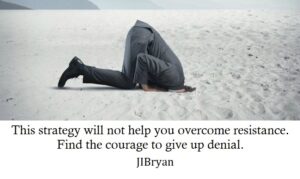 protect ourselves from painful feelings and to hide aspects of ourselves. For example we may use the defense mechanism of denial to pretend that our anger does not exist because we are afraid of it. We may feel ashamed of our anger. Since vulnerability with ourself brings us in touch with our anger we avoid vulnerability. Face your feelings fearlessly. Learn about your feelings to develop the confidence that enables you to experience, interpret, and enjoy them. Develop the self-acceptance that says, “Being human means that there are parts of me that I am not pleased with but do not have to be ashamed of.” Find the courage and confidence you need to recognize and drop the defense mechanisms you use. This lessens your resistance to vulnerability.
protect ourselves from painful feelings and to hide aspects of ourselves. For example we may use the defense mechanism of denial to pretend that our anger does not exist because we are afraid of it. We may feel ashamed of our anger. Since vulnerability with ourself brings us in touch with our anger we avoid vulnerability. Face your feelings fearlessly. Learn about your feelings to develop the confidence that enables you to experience, interpret, and enjoy them. Develop the self-acceptance that says, “Being human means that there are parts of me that I am not pleased with but do not have to be ashamed of.” Find the courage and confidence you need to recognize and drop the defense mechanisms you use. This lessens your resistance to vulnerability.
Finally, vulnerability in a relationship tends to encourage love and intimacy. To the degree that we are afraid of love and intimacy is the degree that we avoid vulnerability. It is natural to have some fears about love and intimacy and therefore some blockages to love, intimacy, and therefore to vulnerability. Some blockages come in the form of beliefs like, “Love does not really exist. We just pretend.” Or “Intimacy has nothing to offer except fear and anxiety.” Or “Love makes you soft and open to attack.” Change your beliefs to eliminate your blockages to love and intimacy and to open yourself to vulnerability.
Point of Empowerment: In order to develop innocence and vulnerability we need to have self-acceptance, self-esteem, self-worth, and self-love. Decide that you want more of these aspects of self and seek to develop them.
CONCLUSION
In the past four Letters we explored innocence and vulnerability. We examined definitions, benefits, uses, and resistance. Hopefully we see the value of innocence and vulnerability, that they are integral to creativity, love, and intimacy and how they enable us to live full and rich lives. Commit yourself to understanding and using innocence and vulnerability in pursuit of an enriched, loving, and joyful life.
